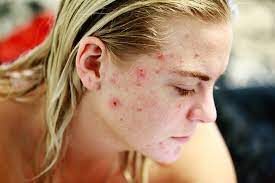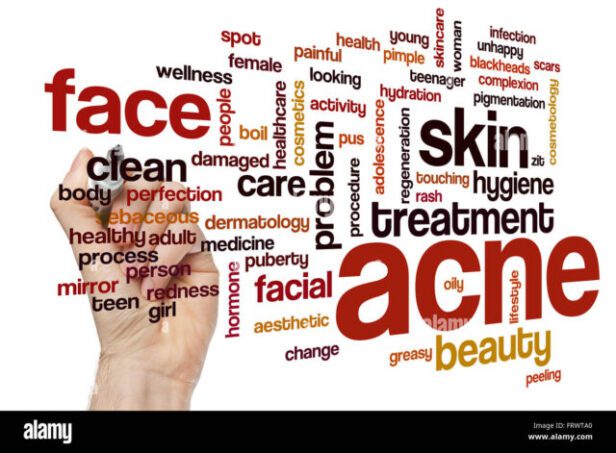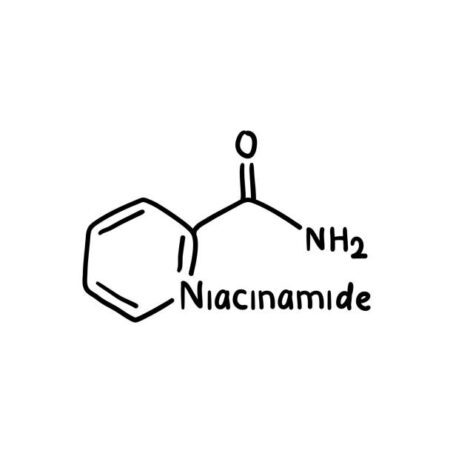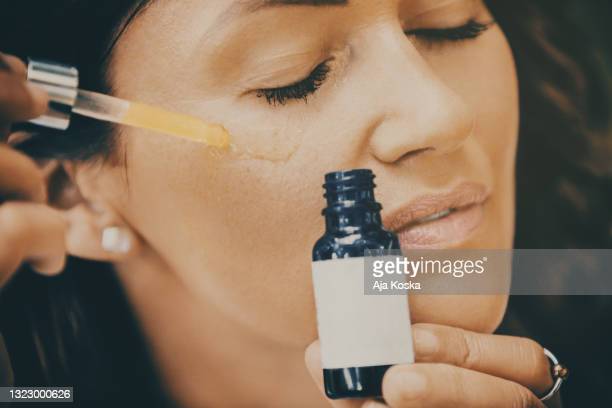Looking for how to deal with acne scars ? Acne scars can be a source of embarrassment, frustration, and insecurity for those who suffer from them. Acne is a common skin condition that affects millions of people worldwide, and while it can be treated, the scars it leaves behind can last a lifetime. Fortunately, there are steps you can take on how to deal with acne scars and improve skin’s appearance. Here, we will discuss how to deal with acne scars, the types, causes, and treatments for acne scars and provide tips for preventing new scars from forming.
What is acne?
Acne is a skin condition that occurs when the hair follicles become clogged with oil and dead skin cells, leading to the formation of pimples, blackheads, and whiteheads. While acne is a common problem among teenagers, it can affect people of all ages. While some people may experience only occasional breakouts, others may suffer from persistent acne that leaves behind scars.
What are acne scars?
Acne scars are indentations or raised areas of skin that occur after a pimple or cyst has healed. There are two main types of acne scars: atrophic scars, which are indentations in the skin, and hypertrophic scars, which are raised areas of skin. The severity of acne scars can vary greatly, and they can cause emotional distress and impact a person’s self-esteem. Dealing with acne scars is important for improving the appearance of the skin and regaining confidence. In this article, we will provide an overview of the steps you can take to manage acne scars, including prevention, home remedies, medical treatments, and lifestyle changes.
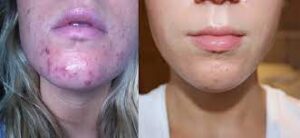
Understanding Acne Scars
Acne scars are the result of damage to the skin that occurs when pimples or cysts become inflamed. This inflammation can cause the skin to break down and form scars, which can take many forms. There are two main types of acne scars: atrophic scars and hypertrophic scars.
Atrophic scars are indentations in the skin and are the most common type of acne scar. They can be caused by a loss of collagen and elastin in the skin, which can occur as a result of acne or other skin conditions. Atrophic scars can appear as shallow or deep pits in the skin and can be difficult to treat.
Hypertrophic scars are raised areas of skin that can occur as a result of excessive collagen production during the healing process. Hypertrophic scars are often red and raised, and they can be itchy or painful. They typically occur in areas where acne breakouts are most frequent, such as the face, chest, and back.
To identify acne scars, it’s important to look for signs of indentations or raised areas of skin. If you have acne scars, you may also notice that your skin appears discolored or has an uneven texture. In some cases, acne scars may also be accompanied by redness or swelling.
Prevention of Acne Scars
The best way on how to deal with acne scars is to prevent them from forming in the first place. To do this, it’s important to take steps to prevent acne breakouts and to treat acne promptly when it does occur.
One of the most effective ways to prevent acne is to maintain a routine that is tailored for you. This may include using gentle cleansers, moisturizers, and sunscreens. It’s also important to avoid using harsh or abrasive skincare products, which can irritate the skin and trigger acne breakouts.
Another important step in preventing acne scars is to seek treatment for acne as soon as possible. If you have persistent acne or if you have a history of scarring, it’s a good idea to see a dermatologist who can recommend a treatment plan that’s right for you. The earlier you treat acne, the less likely you are to experience scarring.
Home Remedies for Acne Scars
In addition to medical treatments, there are also several home remedies that can help how to deal with acne scars. Some of the most popular home remedies for acne scars include:
Lemon Juice: Lemon juice has natural skin-lightening properties and can help to improve the appearance of acne scars over time. To use lemon juice on your skin, simply squeeze a lemon and apply the juice to the affected area with a cotton ball. Leave the juice on for 10-15 minutes, then rinse it off with warm water.
Aloe Vera: Aloe vera is a natural plant that has been used for centuries to address various skin conditions, including acne scars. Aloe vera is known for its anti-inflammatory and moisturizing properties, which can help to improve the appearance of scars over time. To use aloe vera on your skin, simply apply the gel directly to the affected area and leave it on for 10-15 minutes. Rinse it off with warm water and repeat the process 2-3 times a day.
Honey: Honey has natural antibacterial properties that can help to reduce the appearance of acne scars over time. To use honey on your skin, simply apply a thin layer of raw honey to the affected area and leave it on for 10-15 minutes. Rinse it off with warm water and repeat the process 2-3 times a day.
Cucumber: Cucumber is another natural remedy that can help to reduce the appearance of acne scars. Cucumbers contain antioxidants and vitamins that can help to improve the health of the skin and promote healing. To use cucumber on your skin, simply cut a fresh cucumber into slices and apply the slices directly to the affected area. Leave the slices on for 10-15 minutes, then rinse them off with warm water.
Essential Oils: Essential oils such as tea tree oil, lavender oil, and frankincense oil, can help to reduce the appearance of acne scars by promoting the growth of new skin cells and reducing inflammation. These oils can be added to a carrier oil, such as jojoba oil, and applied directly to the skin.
Topical Treatments for Acne scars
There are several topical treatments that can help to reduce the appearance of acne scars, including retinoids, Vitamin C, and glycolic acid. Retinoids are a form of Vitamin A that can help to boost collagen production thereby improving overall skin texture. Vitamin C is a powerful antioxidant that can help to brighten the skin. Glycolic acid is an alpha-hydroxy acid that can help to gently exfoliate the skin and improve its texture and tone. It is important to use these treatments as directed and to be patient, as it may take several weeks or even months to see significant improvement.
Medical Treatments for Acne Scars
If topical treatments are not enough to improve the appearance of your acne scars, there are other medical treatments that can help. Some of the most common medical treatments for acne scars include:
Chemical Peel
Chemical peel falls under the types of exfoliation treatment. It is one that uses chemicals to remove the top layer of skin. This can help to improve the appearance of acne scars by removing dead skin cells and promoting the growth of new, healthy skin. Chemical peels are typically performed by a dermatologist and can be done in-office.
Microdermabrasion
Microdermabrasion is a type of exfoliation treatment that uses a special device to get rid of old and dead cells, revealing healthier ones. This treatment can help to improve the appearance of acne scars by removing discoloration and promoting the production of collagen and elastin. Microdermabrasion is typically performed by a dermatologist and can be done in-office.
Dermabrasion
Dermabrasion is a more aggressive form of exfoliation that uses a special tool to remove the top layer of skin. This treatment can be effective for improving the appearance of acne scars, but it is typically reserved for more severe cases of scarring. Dermabrasion is typically performed by a dermatologist and can be done in-office.
Laser Therapy
Laser therapy uses light energy to penetrate the skin and promote the growth of new, healthy skin. This treatment can be effective for improving the appearance of acne scars by removing discoloration and promoting the production of collagen and elastin. There are several types of laser therapy available, including fractional laser resurfacing and non-ablative laser therapy. Laser therapy is typically performed by a dermatologist and can be done in-office.
Fillers
Fillers are a type of treatment that can be used to fill in acne scars and improve the appearance of the skin. Fillers are typically made from materials such as hyaluronic acid or collagen, and they are injected into the skin to help fill in indented scars. Fillers are typically performed by a dermatologist and can be done in-office.
Scar Revision Surgery
Scar revision surgery is a type of procedure that is performed to improve the appearance of scars. Scar revision surgery can be used to improve the appearance of acne scars and can involve the removal of scar tissue and the repositioning of surrounding skin to minimize the appearance of the scar. Scar revision surgery is typically performed by a plastic surgeon and can be done in-office or in a hospital setting.
Lifestyle Changes
Diet
Diet can play a role in the development of acne and the healing of acne scars. Eating a balanced diet that is high in fruits, vegetables, and lean proteins can help to support skin health and reduce inflammation. Additionally, limiting your consumption of processed foods, sugar, and dairy can help to reduce your risk of developing acne.
Hydration
Staying hydrated is essential for overall skin health and can help to improve acne scars. Drinking plenty of water will keep skin hydrated and plump, which can help to reduce the appearance of indented scars.
Sleep
Getting enough sleep is important for overall health and can also help to improve the appearance of acne scars. When you are well-rested, your body is able to repair itself and promote the growth of new skin cells.
Dealing with acne scars can be a challenging experience, but there are several effective strategies available to help reduce their appearance or even get rid of them altogether. Whether you choose medical treatments, lifestyle changes, or at-home skincare remedies, the key to success is consistency and patience. Work with your dermatologist to find the best approach for you and achieve a clearer, smoother complexion. Additionally, it’s important to be kind to yourself and remember that it took time for the scars to form and it will take time for them to fade. Be patient and stay consistent with your chosen approach, and you will eventually see results.
